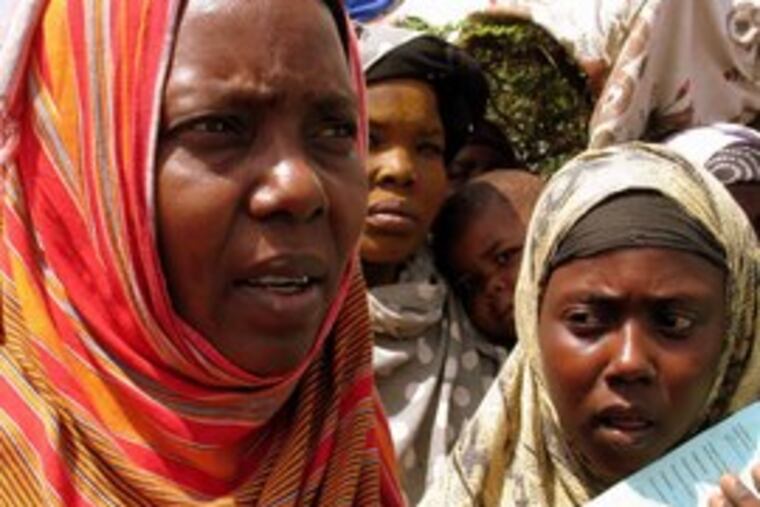Beyond the brink of collapse
The problems of this war-racked nation have reached catastrophic proportions.

AFGOYE, Somalia - A year after the U.S.-backed Ethiopian army toppled a hard-line Islamist regime in Somalia, the country has become Africa's worst humanitarian catastrophe.
Some 200,000 refugees, mostly women and children, have fled from a pro-government offensive to makeshift camps along a 10-mile stretch of sun-baked asphalt that leads from the seaside capital of Mogadishu toward the inland town of Afgoye.
The crisis is brutal on young people.
One night last month, Fatima Sheikh Ali awoke to the deafening crash of mortar rounds on her neighbor's roof. Shrapnel blasted through Ali's tin-walled home in Mogadishu, and sent her 13-year-old daughter, Muna, into her arms, quaking.
Sometime in the chaos of that night, Muna stopped speaking. In an overcrowded encampment of sand and scrub a few miles from the capital, where the family now lives among thousands made homeless by the war, Muna silently collects firewood and looks after her siblings, a worried gaze fixed in her eyes.
"She is traumatized," her mother said, and a warren of women who had gathered around her murmured sympathetically. A nurse with the Somali Red Crescent Society said, "There is nothing to be done. It is a very sad story."
The conflicts in Sudan's Darfur region and in eastern Congo may have displaced more people, but international relief efforts in Somalia have faltered in the face of violence that has emptied entire neighborhoods in Mogadishu.
Most displaced Somalis, such as Muna's family, live in dome-shaped huts made out of spindly tree branches and covered with tattered swatches of fabric or plastic. They sprout from the sand like multicolored mushrooms along the road from the capital.
The United Nations Children's Fund said earlier this month that one-quarter of the refugees around Afgoye were younger than 5. Both sides are using older boys as combatants, and girls who venture out of the camps risk being raped by freelance militias, the agency said.
"Things are now getting absolutely worse," said Christian Balslev-Olesen, UNICEF representative for Somalia. "There is a dirtiness to this war. Children are a real target."
Fewer than 1 in 10 Mogadishu children attends school. Muna and her siblings aren't among the lucky ones. Their southern neighborhood of Hodan has seen near-daily fighting as Somali government troops and their Ethiopian allies hunt for insurgents amid the low, whitewashed storefronts.
The restaurant where Muna's father worked as a waiter has been closed since March, when its owners fled the city. Most of their neighbors also have left.
"There is no movement in the streets, no work, hardly any food," said Ali, Muna's mother, who has six other children. "The only sound is the whistling one," she said, a term Somalis use to describe the rockets that whiz over their rooftops at night.
Local groups estimate that 6,000 people have died in the fighting this year.
Traveling Somalia's roads is fraught with danger. Aid groups and former residents say that Somali government forces, far from ending militia rule, are starting to behave like militias themselves. Checkpoints have popped up throughout southern Somalia, with government soldiers and allied militiamen demanding payments and harassing civilians and relief workers.
According to UNICEF, sick children and pregnant women often are turned away at checkpoints. In some areas, trucks carrying food and other humanitarian aid have to pay tolls of $500 each, U.N. officials said.
Last week, Somalia's internal security chief closed airstrips and ports outside Mogadishu for several hours, leaving nearly 4,000 tons of emergency food aid stuck aboard U.N.-chartered ships floating in the sea.
For ordinary Somalis, the government checkpoints are often scenes of terror. Shukri Mohammed, a weary-faced woman who walked three days on bare, swollen feet to reach the safety of a camp, said she was stopped as she left Mogadishu with her seven children.
The poor widow had nothing in her pockets. That seemed to annoy the uniformed men at the roadblock. "Because they didn't get any money from me, they hit me," she said, cradling her 2-year-old son while showing the bruises on her arm.
A few hundred yards away, Muna's mother worried that the rations weren't enough for a family of nine. She sighed. Blasted by rains, their hut was also starting to wilt. "The fighting is different now," she said. "Now it is everywhere. The shelling comes from all sides."
But here, she went on, they feel safe. Maybe in a few weeks they could return home, "if the Ethiopian troops leave Mogadishu," she said.
Muna, standing nearby, didn't utter a word.
To view a slide show of Somali refugees, go to